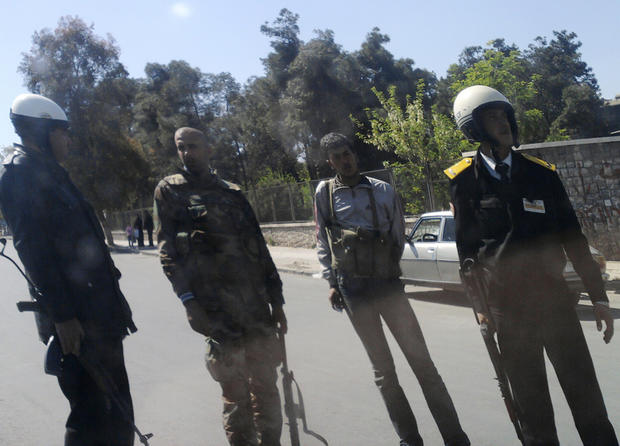With rise in Syria unrest, a rise in crime
(CBS News) DAMASCUS - Once boasting to be one of the "safest" places in the world, Syria is feared to be turning into a hot spot of mounting violence, as unrest heralds further instability in certain areas, coupled with crime, revenge, robbery, and economic and social chaos.
With the bloody turbulence sweeping almost half the country for nearly a year, talk of increasing rates of random crimes and murder have surfaced over the past few months, attributed to a lack of police forces on the ground capable of controlling the situation, particularly in areas where clashes could erupt between Army units and gunmen.
There have been wide talks about crimes against people, sometimes for personal revenge, exploiting the state of anarchy and disorder in some rural areas. In such cases, especially in the countryside, even if the family of a victim reports to a police station, police might find themselves incapable of doing anything to bring the killer to justice without the support of Army units and soldiers.
Syria hands over bodies of foreign journalists
Shelling of Homs resumes in Syria, activists say
Syria: No Red Cross access to battered district
Eyewitnesses say that some police stations close their doors in the evening, fearing attacks by unidentified gunmen, and turn down any call for help unless there is an urgent security need to do so.
The Interior Ministry has publicly allocated certain phone numbers for the public to report any security incident as part of the state crackdown on the unrest. Those numbers are on state-run television around the clock.
In the past, crimes such as kidnapping a member of a wealthy family for ransom were truly very rare in Syria (particularly in rural areas), thanks to the iron grip of the security services - who are now occupied mainly with chasing gunmen and opponents of the Assad regime.
Instability and insecurity in rural areas have lured some people to opt for robbery and theft. Usually an armed individual or a gang could threaten other people with surrendering money and personal belongings or he/she simply faces death or being shot and wounded.
A traveler to Edleb Province, a hot spot in the north of the country, told CBS News that a few days ago he was among several passengers on a minibus that was stopped by a group of hooded armed men, who ordered the travelers to leave their money and belongings. The passengers were strictly inspected, and all of their money was robbed under threat, along with their mobile phones, watches and other valuables.
The traveler (who identified himself as Ammer) added that he tried not to tell the robbers about all the money in his pockets, but when they discovered that he was cheating them he received many hits with the butts of their Kalashinkovs.
"I thank God they left me and the other passengers alive," he added.
Ordinary life in the country has generally diminished under worsening security conditions: People (especially in rural areas) prefer to go back home as soon as evening begins. Usually no outdoor social activities or parties are held there. Even wedding parties are celebrated in homes or, in best cases, in saloons for a very short time, out of fear of being caught in a sudden crossfire.
In addition, growing poverty and unemployment due to the conditions in the country may play a big part in the spread of crime, armed robbery, kidnapping people and fraud.
Over the past few months Syrian consumers have seen an unbearable rise in the prices of main foodstuffs, sometimes from 30 to 50 percent for imported and even locally-made goods. The reason given by businessmen and merchants is that the state has imposed big duties on imported goods.
Talk is dominated by anxiety and worry over the future, and evenings are often spent in front of TV satellite channels following up on news about Syria. Melancholy, and sometimes depression, are high among people anxious about what is going to happen.
The U.S. Embassy in Damascus has closed its doors recently for "security reasons," a further possible sign of security deterioration in Syria. Other Arab and foreign embassies had already advised their nationals to leave the country for same reason.
